Lost In Myth: Are You A Candidate?
 Wanna know why the Man In Black is really trapped on the island? It’s not because he’s malevolence, evil, or darkness, and it’s not because Jacob wouldn’t let him leave. It’s because he hasn’t overcome his issues. And what are his issues? Up to now, all we know is that he seems to be terribly frightened of adolescent boys. Hopefully, we’ll get a better answer next week, but as ridiculous as this might sound, I actually think there may be something to it.
Wanna know why the Man In Black is really trapped on the island? It’s not because he’s malevolence, evil, or darkness, and it’s not because Jacob wouldn’t let him leave. It’s because he hasn’t overcome his issues. And what are his issues? Up to now, all we know is that he seems to be terribly frightened of adolescent boys. Hopefully, we’ll get a better answer next week, but as ridiculous as this might sound, I actually think there may be something to it.
If there is one theme that has remained, uh, constant on Lost, it is that all the Losties had major issues that were affecting their lives. The island presented them with opportunities to solve these issues, and once they did, they died. Charlie overcame his drug addiction, Mr. Eko released the guilt he had from his brother’s death, Shannon learned responsibility and selflessness, even Juliet finally came to understand that just because you loved someone, doesn’t mean they’re right for you—an issue that had been haunting her since her parents’ divorce.
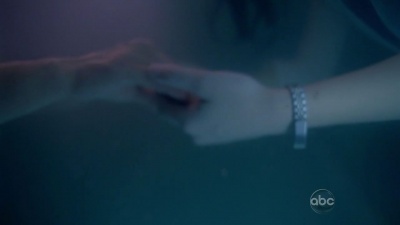 In “The Candidate” we lose Sayid shortly after he decides not to kill Desmond for his own selfish purposes, we lose the Kwons after they are reunited and Jin promises never to leave Sun again—solidifying their love, and we lose Frank because, let’s face it, his only purpose this season was to fly the plane off the island. Once that plan was killed, so was Frank. But not to worry, if he’s anything like a character in a Burt Reynolds movie as Sawyer claimed, surely he’ll show up in the end-credit bloopers.
In “The Candidate” we lose Sayid shortly after he decides not to kill Desmond for his own selfish purposes, we lose the Kwons after they are reunited and Jin promises never to leave Sun again—solidifying their love, and we lose Frank because, let’s face it, his only purpose this season was to fly the plane off the island. Once that plan was killed, so was Frank. But not to worry, if he’s anything like a character in a Burt Reynolds movie as Sawyer claimed, surely he’ll show up in the end-credit bloopers.
So, in words that are reminiscent of Willy Wonka, three nasty, naughty little children gone, five good, sweet little children left. Actually, strike that—reverse it. The ones left still have issues that haven’t been completely resolved. They’re very close now, but not quite there yet—except for Jack. I believe his on-island self has solved his need to fix everything and taken a leap of faith towards, well, faith. So, why hasn’t he died? Let’s look to our old friend mythology for an answer.
According to Buddhist beliefs, there is a very rare being who is so selfless, he or she not only reaches enlightenment, but postpones the infinitely pleasurable experience of Nirvana in order to stick around in the hell that is earth, just to help others. This being is known as a Bodhisattva. We’re talking about Buddhism here, the same religious philosophy that uses terms like dharma, namaste, and the 108 defilements which one must overcome to reach enlightenment. So, perhaps when looking to explain Lost, looking to Buddhism is a correct step on our dharmic path towards answers.
 Mythically speaking, this season, Jack has taken on the qualities of a Bodhisattva by giving up his future in order to stay behind on the island. Again, this is a theme, and likely will never be overtly explained. Lost’s answer to the Bodhisattva however, is the candidate, which hopefully will be shown. The candidate is chosen, presumably, because he or she has qualities similar to the bearer of the position that is to be replaced, i.e., Jacob. So, the candidate to be chosen will be the one who is most like him. But there has been some confusion as to what his qualities actually are. On the island, we have two main archetypes—good and evil. It seems increasingly likely that the “good” is Jacob—he who has reached enlightenment but postpones it to help others do the same. Have we seen this? It sure seems that way.
Mythically speaking, this season, Jack has taken on the qualities of a Bodhisattva by giving up his future in order to stay behind on the island. Again, this is a theme, and likely will never be overtly explained. Lost’s answer to the Bodhisattva however, is the candidate, which hopefully will be shown. The candidate is chosen, presumably, because he or she has qualities similar to the bearer of the position that is to be replaced, i.e., Jacob. So, the candidate to be chosen will be the one who is most like him. But there has been some confusion as to what his qualities actually are. On the island, we have two main archetypes—good and evil. It seems increasingly likely that the “good” is Jacob—he who has reached enlightenment but postpones it to help others do the same. Have we seen this? It sure seems that way.
The island has helped the lost Losties grow past their issues, enabling them to “die.” But nobody ever really dies on Lost. Even if they don’t get reanimated by the smoke monster, dunked into a holy pool, possessed by evil, turned into a zombie, revealed in spirit form, seen or heard by Hurley or Miles, or shown again in a flashback or time travel sequence, we have our convenient flash-sideways timelines to see everyone again. And as I’ve been saying, I believe that this timeline represents the Losties’ lives after their island experience—after their redemption. Sure, they still have their issues, but for the most part they are all in better shape than they were. This seems to be all thanks to Jacob.
So if the candidate must reach enlightenment but postpone it to help others, what must the “evil” archetype do? He must not only not reach enlightenment, but also try to prevent others from doing so. In “The Last Recruit,” the Man In Black admits to Jack that all he ever wanted to do was help the Losties get off the island. He says it like he was doing them a favor, but if the island is meant to help them, he isn’t. He’s preventing them from reaching enlightenment. He has not gotten over his issues so he doesn’t want anyone else to either. The Man In Black isn’t a prisoner of the island; he is a prisoner of his own inability to change. In fact, I do not think he is going to ever get off the island. I think in “The End” we are going to see him on the beach with Jack, complaining about how much he wants to kill him. This is where the show is leading us—at least in the original timeline.
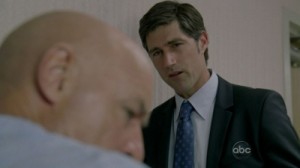 In the flash-sideways, mirror world, Locke may be a candidate, but on the island, it’s Jack. Jack and John—they are two sides of the same person. They even have the same name since Jack is a nickname for John. Just like the yin-yang symbol though, each has a bit of the other inside of him. This was shown in this episode when sideways Jack unknowingly echoed Locke’s words to him: “I wish you believed me.” Perhaps then, the reason we haven’t heard Man In Black’s name is because it’s a nickname of Jacob—Jake? Nah, too anti-climatic. But I think this line of thinking may be on the right track.
In the flash-sideways, mirror world, Locke may be a candidate, but on the island, it’s Jack. Jack and John—they are two sides of the same person. They even have the same name since Jack is a nickname for John. Just like the yin-yang symbol though, each has a bit of the other inside of him. This was shown in this episode when sideways Jack unknowingly echoed Locke’s words to him: “I wish you believed me.” Perhaps then, the reason we haven’t heard Man In Black’s name is because it’s a nickname of Jacob—Jake? Nah, too anti-climatic. But I think this line of thinking may be on the right track.
Why else haven’t we heard Man In Black’s name? Could be because he’s really a woman. But no, he specifically told Sawyer that he was once a man. Could be lying, but then why not just say that he was once human which wouldn’t have given anything away? He could have the same name as someone we know. Perhaps he even is someone we know—someone who keeps getting reincarnated because he never gets it right—someone like John Locke. In other words, he really is John Locke. Intriguing but too complicated. Perhaps then the Man In Black and Jacob are brothers—but giving away the first name wouldn’t give that away at all. Well, what if his name could literally be Jacob’s brother Esau from the Bible? Maybe, but when it comes to religion, Lost usually sticks to the subtext so as not to alienate viewers. So, where else does that leave us? Hopefully we’ll find out in “Across the Sea.” And hopefully we’ll also find out about the boy.
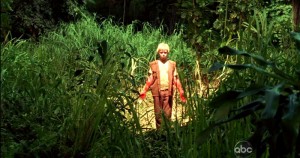 Up until now, I’ve assumed that the boy that has taunted Man In Black was a rapidly growing Jacob—in the vein of Spock when he was reborn on the Genesis planet in Star Trek III. But what if it’s not Jacob, but Man In Black himself? The one person who can taunt him—is himself. His deepest demons lie within. Why the bloody hands? Well, we know he hated his mom. When I thought it was young Jacob, I assumed it was a stigmata, Christ-like symbol representing his resurrection. But the genius of Lost is that they often take advantage of the multi-leveled meaning of symbols and metaphors, enabling them to fool us. The young boy just might be Man In Black’s own projected conscience, nagging him to follow the rules of society. Rules he broke when he, say, murdered his crazy mother. As punishment, perhaps he was sentenced to a Panopticon-like prison (see “Lost In Myth: ‘Ab Aetern’-Cadabra! And the Island Is…A Cork??”) that is the island of Lost. An island meant to help him overcome his issues. Issues which, thousands of years later, he still hasn’t overcome.
Up until now, I’ve assumed that the boy that has taunted Man In Black was a rapidly growing Jacob—in the vein of Spock when he was reborn on the Genesis planet in Star Trek III. But what if it’s not Jacob, but Man In Black himself? The one person who can taunt him—is himself. His deepest demons lie within. Why the bloody hands? Well, we know he hated his mom. When I thought it was young Jacob, I assumed it was a stigmata, Christ-like symbol representing his resurrection. But the genius of Lost is that they often take advantage of the multi-leveled meaning of symbols and metaphors, enabling them to fool us. The young boy just might be Man In Black’s own projected conscience, nagging him to follow the rules of society. Rules he broke when he, say, murdered his crazy mother. As punishment, perhaps he was sentenced to a Panopticon-like prison (see “Lost In Myth: ‘Ab Aetern’-Cadabra! And the Island Is…A Cork??”) that is the island of Lost. An island meant to help him overcome his issues. Issues which, thousands of years later, he still hasn’t overcome.
But hold on, if the island is a rehabilitative prison of sorts, how can it be thousands of years old? I’ve been thinking of one way that I think would make a lot of sense as an ending—an ending that borrows from The Myth of Lost theory and then mixes it with one of the oldest theories of Lost—the one that takes us back to Atlantis.
Unlike the original theory, I don’t think that the island itself is Atlantis, but what if Jacob and his nemesis came from there. Actually, it doesn’t have to be Atlantis, just some ancient, yet advance civilization that completely predates all of mankind. Let’s just call it Atlantis because it fits the mythology we are already familiar with. Now, Atlantis was doomed—doomed by its own technology. Knowing this, a group of leaders decide to save some of the more representative members of their society to keep their species alive by bringing them to a “new world” (sort of like Jor-El saving his son who becomes Superman). But in order to prevent repeating the same mistakes they’ve made, they first create a testing ground that all new inhabitants must successfully go through before being released into this new world. This testing ground is the island—a place created not by magic, but technology of an ancient yet highly advanced civilization.
Jacob takes the Bodhisattva role as the guardian of this realm, with the Man In Black as his first prisoner/counterpoint. Over time, all new prospects for the New World are brought to the island where they must overcome their issues before being released there. As they solve their issues, they “die,” bringing them into the real world. While they do not remember their experiences from the island, subconsciously, they recall bits and pieces, and hence the mythology of all of mankind is created. 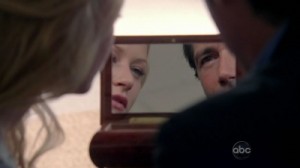 The world they create is hence a reflection of their illusionary island experience: “as above, so below.” The island then is but an illusionary realm—a looking glass—that leads them to their new home (which we have seen in the flash-sideways parallel world).
The world they create is hence a reflection of their illusionary island experience: “as above, so below.” The island then is but an illusionary realm—a looking glass—that leads them to their new home (which we have seen in the flash-sideways parallel world).
Once this new society got rolling, people no longer had to take part in the island initiation since their souls had already been through the program. That is, until Jacob realized that his term was up, and it was time to find a replacement. He searched through many candidates—looking for someone who could reach enlightenment, but delay it in order to help others—another Bodhisattva. In a way, it’s all been a game, but it has been the game of life. A game that only ends once, but everything in between is progress. I may be completely off base, but this is an ending that would satisfy the myth that the show has created—a myth that helps us understand our own lives.
In The Myth of Lost, I wrote:
The law of Lost is that once you conquer your demons, you’re free to leave. And since the island is really an illusion, none of the characters who have died are really dead. Just as when we die in our illusionary, so-called “real” life, we don’t really die if you believe in a soul. The creators of Lost seem to, and that’s why the show is riddled with religious symbolism and meaning.
Regardless of the details of how the show ends—whether you love it, hate it, or are somewhere in between—the important thing to take with you are the show’s lessons. The island is a microcosm of our world. Just like the Losties, we have deep-seated issues that have affected our lives. On Lost, the island is the illusionary realm that challenges the characters to overcome their fears and bad habits to grow as human beings. And once they do, they can move on.
It’s the same in our world. We’re all here in this illusionary realm just to experience the challenges of life and grow from them. If we do, we get to move on to the next level—a realm beyond this one with different rules and challenges to help our soul evolve. If we don’t, we come back and play again. Even within one lifetime however, you get many, many chances to overcome your issues. Every time you fail, you are simply presented with a different version of the same life experience that will help you to overcome it. 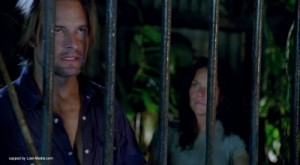 It’s like Sawyer says to Kate as they are put into the cages again in “The Candidate”: “Feels like we’re running in circles.” While this was a subtle acknowledgement of the repeating themes and storyline of the show, it happens for a reason—it is reflective of how our world works. Through repetition, Lost is trying to get it through our thick skulls that the reason many of us and our society are stuck in this loop, is because we keep making the same mistakes and following the same patterns over and over. All we need to do is break the cycle to move forward.
It’s like Sawyer says to Kate as they are put into the cages again in “The Candidate”: “Feels like we’re running in circles.” While this was a subtle acknowledgement of the repeating themes and storyline of the show, it happens for a reason—it is reflective of how our world works. Through repetition, Lost is trying to get it through our thick skulls that the reason many of us and our society are stuck in this loop, is because we keep making the same mistakes and following the same patterns over and over. All we need to do is break the cycle to move forward.
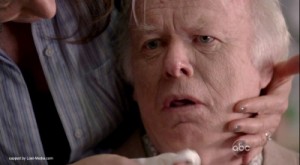 Jack and Locke in particular have been doing the “I can’t let go” dance since Season 1. At the end of “The Candidate” both finally admit it. Locke can’t let go of his guilt about what he did to his father. In the original timeline, Locke couldn’t let go of the anger about what his father did to him. For Jack, in both timelines, he had trouble letting go of his need to fix everything. These two sides of the same coin are perfect for each other and will likely spend a few thousand years together on the island as its new guardians. Jack will continually want to fix Locke, and Locke will continually be bitter about his dad—or, as the Man In Black, bitter about his crazy mother. Either way, he doesn’t like being told what he can’t do, especially by Jack who tells him he can’t let go.
Jack and Locke in particular have been doing the “I can’t let go” dance since Season 1. At the end of “The Candidate” both finally admit it. Locke can’t let go of his guilt about what he did to his father. In the original timeline, Locke couldn’t let go of the anger about what his father did to him. For Jack, in both timelines, he had trouble letting go of his need to fix everything. These two sides of the same coin are perfect for each other and will likely spend a few thousand years together on the island as its new guardians. Jack will continually want to fix Locke, and Locke will continually be bitter about his dad—or, as the Man In Black, bitter about his crazy mother. Either way, he doesn’t like being told what he can’t do, especially by Jack who tells him he can’t let go.
The message for us is so simple but takes an entire lifetime or multiple lifetimes to accomplish. All of that fear, guilt, and anger that we hold in inside…let it go. It’s living in your mind rent-free—evict it! Holding on to pain, hurt, anger, or resentment is like drinking poison and expecting someone else to die. It poisons your own experience—explaining the life of most of the Losties who are really all of us. So let go of whatever resentment and anger you’ve been holding on to. The more you let go, the more room you make for new things to come into your life. These things could be good or bad, but as we learn on Lost the choice is up to you. You can chose dark, or you can chose light.
In reality, it’s not usually so black and white. You will always be influenced by these two forces. But that’s okay. You don’t need to be a pure Bodhisattva to play the role of one. If you’re going to help others deal with their issues, it can be good to still have your own, or else, how will you be able to relate to those you’re trying to help? You don’t have to be completely enlightened to help others find their own enlightenment. All you have to do is make the choice and do your best to follow through. That’s what it takes to be a candidate in our world. So, next time you have the opportunity, take what you’ve learned from Lost and help someone who could benefit from your new wisdom. That way, even if the show doesn’t provide a fulfilling ending, at least it won’t have been for nothing. It will have provided a way for you to bring about one less lost person in the world. Even if that person happens to be you.
Marc Oromaner is a New York City writer whose book, The Myth of Lost offers a simple solution to Lost and uncovers its hidden insight into the mysteries of life. He can be contacted in the discussion section of The Myth of Lost Facebook page or on his new blog The Layman’s Answers to Everything.
The Myth of Lost is available on Amazon and barnesandnoble.com.



3 Responses Leave a comment
“The Man In Black isn’t a prisoner of the island; he is a prisoner of his own inability to change.”
Interesting/ironic choice of words since that’s all that character has been doing since Season 1 is change – change into the Smoke Monster and any number of other dead characters. And maybe, that’s what his core problem is, he’s not true to himself since he’s too busy altering his form and manipulating others for reasons we’re still speculating about.
WOW. I really really love your articles and this one is the best ive read. If youre writing a book after lost is over ill be first in line to buy it.
Glad you like them! If my publishers approves, I plan on doing an update to my current book, but it will likely be some time before it’s available. In the meantime, you can check out the original book here: http://www.amazon.com/dp/0595484565/?tag=orowriter-20
or, the e-book
http://www.iuniverse.com/Bookstore/BookDetail.aspx?BookId=SKU-000060136
Namaste!